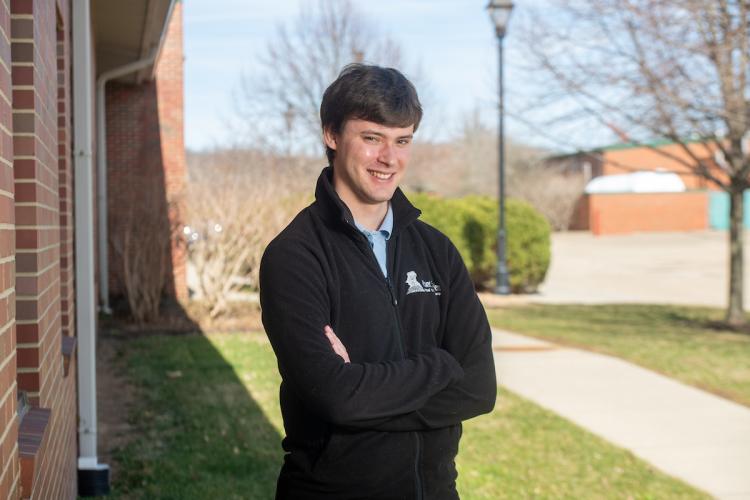
Ohio University student Edward Drabold named to the National Science Foundation’s Graduate Research Fellowship Program

Ohio University senior and Athens native Edward Drabold was recently awarded a National Science Foundation (NSF) Graduate Research Fellowship (GRFP), a prestigious grant that recognizes and supports students pursuing research-based graduate degrees in the natural, social, and engineering sciences. Senior Mason Myers and alumnus Mahmoud Ramadan were also recognized this year by the NSF GRFP with honorable mentions.
“I’m filled with joy to be a part of this prestigious fellowship, a feeling that quickly transformed into gratitude and determination,” Drabold said.
Drabold, an Honors Tutorial College (HTC) Environmental Studies major, researches the use of algae to capture excess carbon in our atmosphere. He focuses on sustainable scale up and control of processes in the biotechnology industry specifically using microalgae as a host organism and intends to take low value wastes such as CO2 or food waste and convert them into high-value bioproducts.
Myers, an HTC Chemistry major, researches drug discovery and Ramadan, a Russ College Chemical Engineering graduate from the class of 2020, also researches carbon capture and is currently a graduate student at the Massachusetts Institute of Technology.
“The NSF GRFP program is extremely competitive and we are incredibly proud of the accomplishments of Ed, Mason and Mahmoud,” HTC Dean Donal Skinner said. “These young researchers epitomize what can be achieved when given the experiential opportunities and environment in which to thrive.”
The NSF GRFP provides three years of financial support to recipients, including an annual stipend of $34,000 and a cost of education allowance of $12,000 to the recipient’s graduate institution.
Through Drabold’s experience studying microalgae, he had the opportunity to join a project with Honda Research & Development during the summer of 2018 that aimed to capture the sustainable energy created by the organism.
“Ed is a big thinker,” Dr. Morgan Vis-Chiasson, a professor of Environmental & Plant Biology, said. “He links together information from different studies to tackle a problem. He has done a number of research projects at Ohio University centered on understanding the growth of algae in engineered systems.”
After graduating from Ohio University this spring, Drabold intends to pursue a doctorate in chemical engineering at Auburn University. There, he will work with Dr. Jin Wang, a professor of chemical engineering, who provided guidance for his GRFP research proposal. His fellowship will begin under Wang, developing this research which will involve creating process control models to control microalgae within continuous systems.
“I hope to establish a sustainable bioeconomy which employs exciting advances in biochemistry and bioengineering,” Drabold explained. “We face such dramatic environmental challenges today - I feel this is a critical part of the puzzle going forward.”
Drabold attributes his success to his research mentors, Dr. David Bayless and Vis-Chiasson, who he has worked with since high school, as well as Dr. Martin Kordesch, with whom he did his research tutorial.
Along with receiving the GRFP, Drabold also received the Goldwater Scholarship his sophomore year at OHIO, as well as was awarded the Presidential Graduate Research Fellowship at Auburn, which recognizes student research achievement for incoming and current students.
He has published three journal articles, one of which he wrote while in high school, and given an invited talk at the Algae Biomass Organization (ABO) Summit – the largest gathering of algae researchers from industry and academia.
“I would like to thank all the wonderful people who have made this moment possible – my parents, my research mentors, my girlfriend, my professors and so many others – in addition to HTC and the Office of Nationally Competitive Awards (ONCA), which have provided transformational opportunities,” Drabold said.
Since 2008, OHIO has had 32 recipients of the GRFP and 41 students who have received honorable mentions.
The NSF GRFP is open to U.S. students who are pursuing or who intend to pursue research-based graduate degrees in the United States. Applicants can apply as graduating senior, alumni, and/or as graduate students, so long as they have completed no more than one year of full-time graduate study at the time of application. Applications are due each year in October. Prospective applicants are encouraged to visit http://nsfgrfp.org to learn more and to contact ONCA Director Chris Lewis at christopherlewis@ohio.edu.
